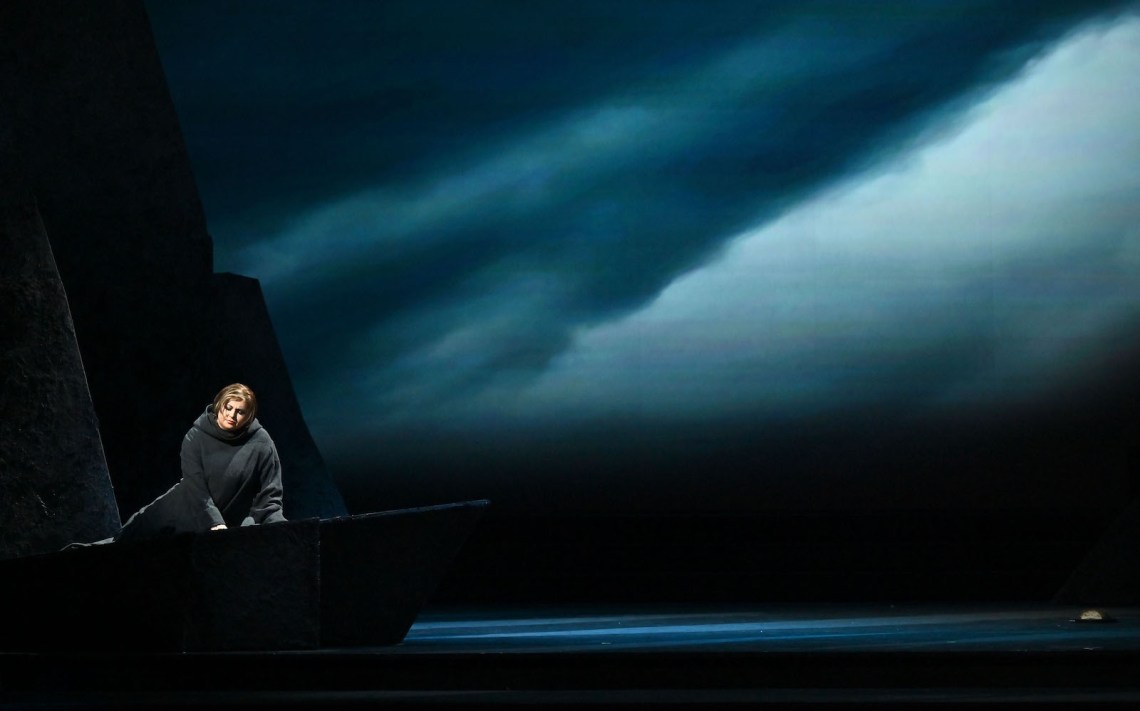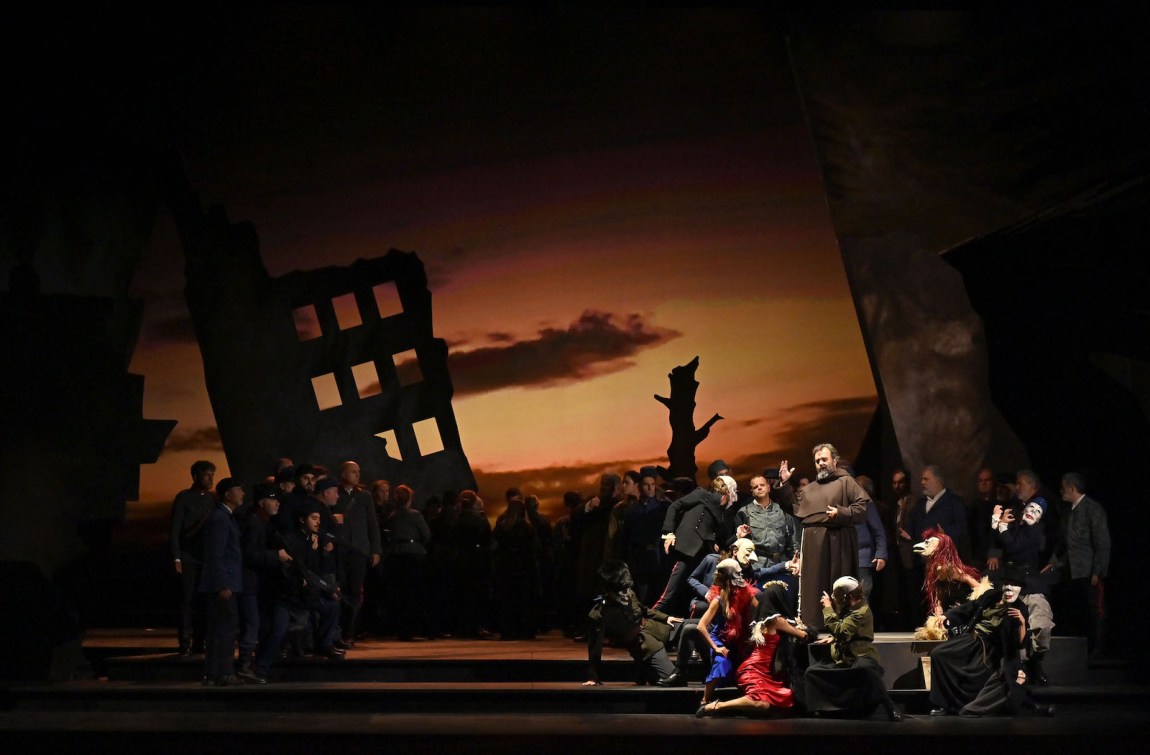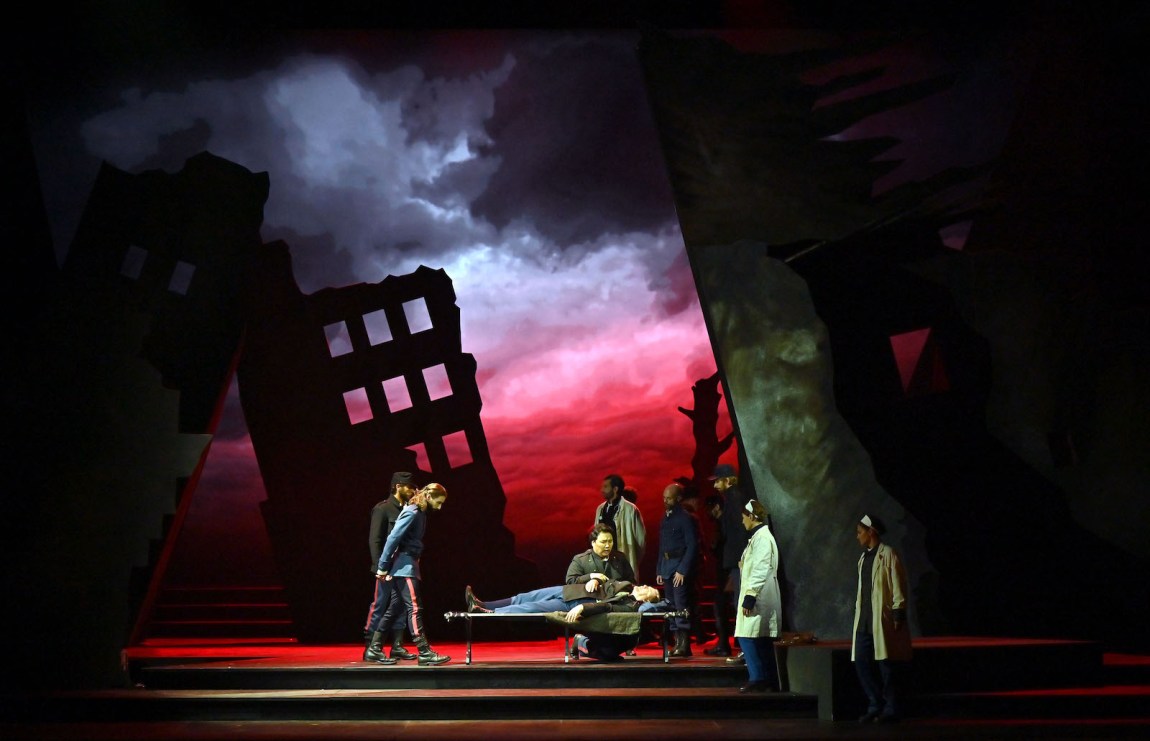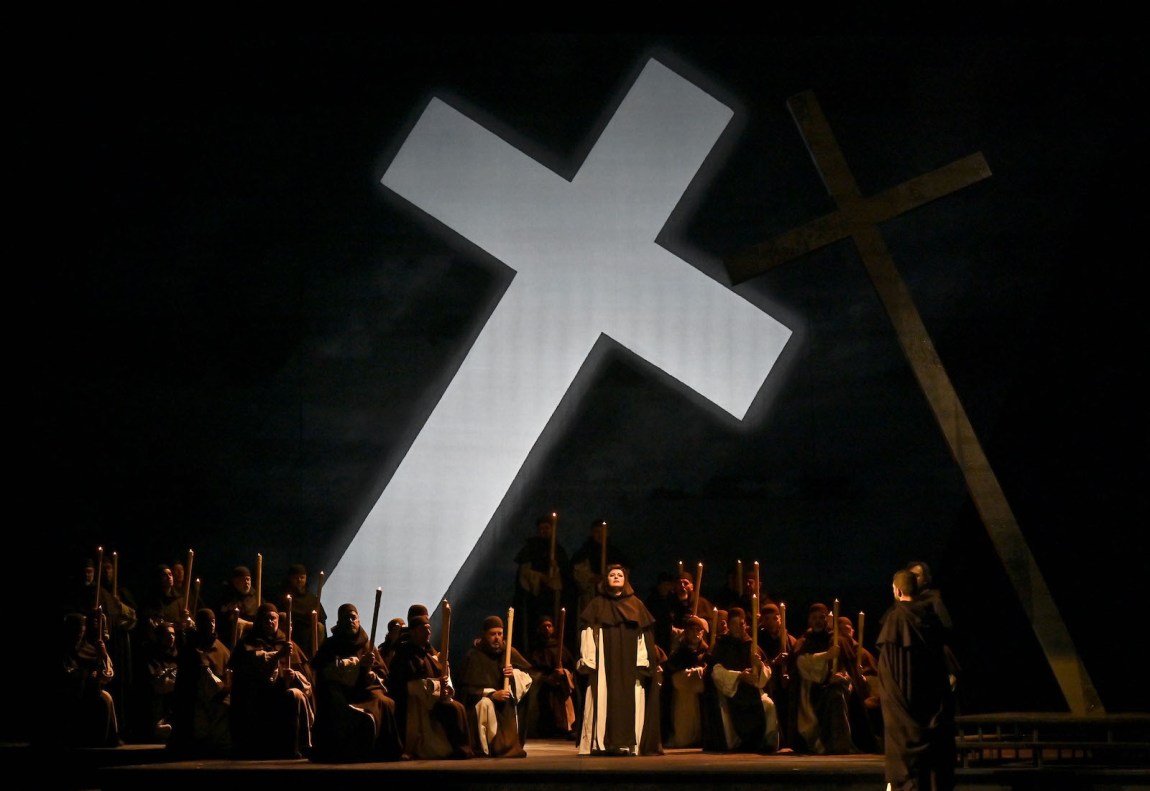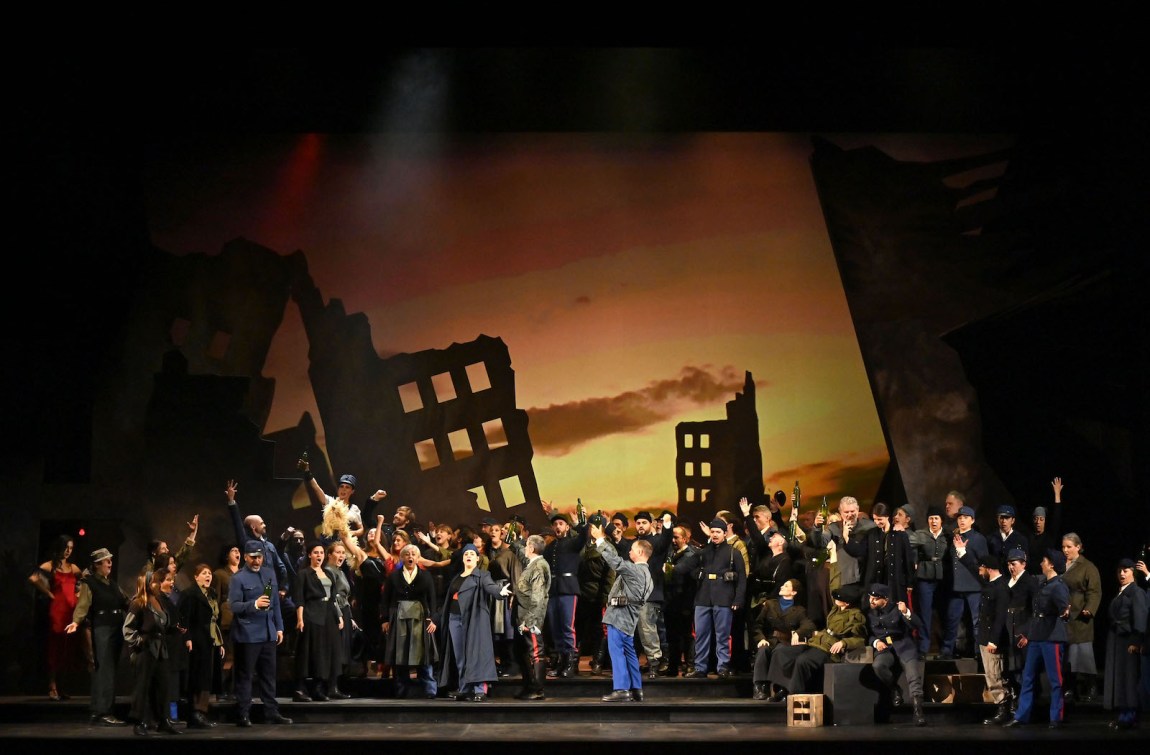The Parma Verdi Festival, dedicated to Italy’s greatest opera composer, opened Thursday night with one of his strangest and most disturbing operas, La Forza del Destino (The Force of Destiny). Set across the landscape of a Europe at war, Forza is an opera of frustrated passion and vindictive obsession, with choruses alternately rapt in solemn prayer or fervid with wartime jingoism. The first roiling figures of the famous overture communicate a mood of urgency and unease—a mood that also hangs over Italy this weekend, as the country goes to the polls on Sunday for national elections that are likely to result in a sharp shift to the extreme right.
Verdi himself—who keenly supported Italian national unification in the nineteenth century and whose face used to appear on the Italian thousand-lire bill—remains a contested national symbol today, susceptible to different political uses and appropriations. Mussolini had no hesitation about sponsoring a Verdi Year of commemorations in 1941, the fortieth anniversary of the composer’s death, and the little town of Busseto, near Parma, where Verdi trained as a musician, has recently tended to elect mayors from the Italian far right who become custodians of the Teatro Verdi and the local Verdian legacy. Leftists, on the other hand, have long appreciated Verdi’s musical indictment of tyranny in the opera Macbeth and his commitment to liberty in his setting of Schiller’s Don Carlos; many have cherished the choral lament of the Hebrew exiles in Babylon, “Va pensiero,” from Nabucco, as an alternative Italian national anthem. Last year local politicians on the right denounced the Parma Verdi Festival for designating a “Queer Night” advertised with an ambiguously gendered poster of Verdi.
Verdi can also be the object of local resentments and struggles, and the performance of Forza Thursday evening was disrupted by booing protesters, angry that the Bologna orchestra and chorus were performing in the Parma Verdi Festival. It is not unusual for the festival to use several orchestras and choruses, but in the current fraught political environment and harsh pandemic economy local rivalries can generate unruly antagonisms.
Italy’s unstable parliamentary democracy has produced some sixty-five governments since the end of World War II. The most recent was headed by Mario Draghi, who was not a politician but the former president of the European Central Bank; his was a government of national unity in response to the pandemic crisis, eschewing party politics and giving government authority to experts and technocrats. The fall of the Draghi government in July (after the parties of the right withdrew their support in parliament) brings politics back in a fierce and uncompromising fashion.
According to polls, the elections on Sunday are likely to produce a far-right government that joins together the nationalist “Brothers of Italy” (Fratelli d’Italia) party of Giorgia Meloni, who may become Italy’s first female prime minister; the “League” of Matteo Salvini, a friend and admirer of Putin and Trump whose “Italy First” rhetoric encourages rage against immigrants; and the “Forza Italia” party of the eighty-five-year-old billionaire Silvio Berlusconi, who refashioned (some would say debased) Italian politics over the last generation. Meloni, whose party takes its name from the bellicose Italian national anthem, has been implicitly appropriating the legacy of Mussolini and Italian fascism, and some Italians fear that she would seek the sort of constitutional weakening of democratic rights and norms that has already occurred in Poland and Hungary.
The right is expected to win enough seats to hold a parliamentary majority partly as a result of voters’ strong anti-establishment impulses, economic frustrations in pandemic times, and the rise of gas and electricity prices amid the deterioration of Russian-EU relations. Salvini has made his political career by denouncing the reception of Mediterranean immigrants on Italian soil, and has favored blocking rescue ships from landing, despite the risk to human lives. Meloni has proposed a “naval blockade” against illegal immigrants. For as long as it lasts, the government is likely to be very hostile to immigration, opposed to abortion rights, skeptical of the European Union, and probably a weaker link in European-American resistance to Putin’s aggression in Ukraine, less than fully committed to strong economic sanctions against Russia.
Meloni, Salvini, and Berlusconi were holding their concluding political rally in Rome’s Piazza del Popolo as the curtain rose in Parma’s nineteenth-century neoclassical opera house, Teatro Regio, a horseshoe theater decorated in elegant white and gold. Verdi’s operas usually premiered in Italian opera houses, with a few Parisian exceptions, and Aida in Cairo after the opening of the Suez Canal—but La Forza del Destino was commissioned by the Imperial Theater in St. Petersburg, and Verdi traveled to Russia for the premiere in November 1862. He was representing Italy in a literal sense, for he had been elected to the first parliament of united Italy in the national elections of 1861. That same year was also a turning point in Russian history, the year of the tsar’s emancipation of the serfs.
Advertisement
The librettist, Francesco Maria Piave, was working from a Spanish play, but Forza is Verdi’s most Shakespearean opera that is not actually based on Shakespeare. It combines tragedy and comedy, private passions and public military campaigns, grandly aristocratic soloists and an unruly choral populace. The noble Spanish heroine, Donna Leonora, is in love with a Peruvian prince, Don Alvaro, who accidentally kills her father when a gun goes off in the opening scene. Leonora disguises herself in men’s clothing and becomes a religious hermit, while Don Alvaro joins the army and Leonora’s brother Don Carlo spends the rest of the opera searching for them both across the battlefields of Europe, obsessively determined to murder them and avenge his family’s honor.
In Parma the role of Leonora was taken by the Kyiv-born soprano Liudmyla Monastyrska, and it was impossible not to be moved by a Ukrainian artist beseeching God for peace, as Leonora does in her famous act IV aria “Pace, pace mio Dio.” With lustrous tone, emotionally intense vibrato, and thrillingly climactic high notes, Monastyrska was a charismatic vocal presence, perhaps especially in her long duet with the Padre Guardiano, the guardian priest of a monastery, sung by the resonantly solemn Croatian basso Marko Mimica. The chorus of monks then assembled for the prayer “La vergine degli angeli,” with Monastyrska raptly taking up their melody. In no other opera does Verdi—not a particularly pious Catholic—give such expression to Marian devotion.
Alvaro was sung by American tenor Gregory Kunde, who received a huge ovation for his anguished aria “La vita è inferno all’infelice” (Life is hell for the unhappy one). His intimate musical companion then is the elegant solo clarinet, but his crucial vocal partner, in a series of magnificent tenor-baritone duets, is the man who becomes his closest army friend and then turns out to be his deadly enemy, Carlo. The baritone was the young Mongolian star Amartuvshin Enkhbat, trained in Ulaanbaatar. He has taken Europe by storm over these last few years as a Verdi baritone, and will make his New York Met debut in January in La Traviata.
Enkhbat also sang in Forza in Florence last year, in an avant-garde production that had him using space and time travel to pursue Leonora and Alvaro across galaxies and millennia. He seemed much more comfortable in the more traditionally conceived and clearly defined Parma production by the Greek-French director Yannis Kokkos. Conductor Roberto Abbado offered marvelous musical clarity, masterfully holding together the complex operatic parts and sustaining the pulse that moves the opera relentlessly forward with the “force of destiny.” Abbado, as musical director of the Parma festival over the last five years, has brought about a revitalization of Verdian performance, working closely with the musicologist Francesco Izzo, director of the publication project for scholarly critical editions of Verdi’s scores.
Forza, with its choral crowd scenes, can be a confusing opera to watch on stage, as the same crowds are manipulated and roused by the Roma fortuneteller Preziosilla (sung by mezzo-soprano Annalisa Stroppa) and then chastised by the comically hectoring friar Fra Melitone (sung by baritone Roberto de Candia). These two magnetic Italian performers, singing in a cast of foreign stars, channeled Verdi’s Shakespearean impulse to bring some of the vulgarity and bawdiness of popular life into the high-minded melodrama. Verdi even composed military anthems, led by Preziosilla (“Viva la Guerra” in Act II and “Rataplan” in Act III), which show us how easily a crowd can be politically manipulated and misled. Traditional prejudice against Roma may have had some part in this characterization (and Salvini has not hesitated in recent years to encourage anti-Roma sentiment), but Verdi clearly admired the forcefulness of Preziosilla’s character. He brilliantly conjures the emotional volatility of the choral crowd; they are the ordinary people whose lives are brutally affected by the ongoing war, who are pursuing their next meal rather than any sense of aristocratic honor, and they are susceptible to shifting personal or political influences.
Italians are well aware that 2022 is the centennial of Mussolini’s march on Rome, which inaugurated the age of fascism in Europe and marked the undoing of Italian constitutional democracy for a generation. La Forza del Destino was performed in Italy during the fascist decades of the 1920s and the 1930s, with superb Italian singers, and first recorded in full on 78 RPM records in 1941, Mussolini’s Verdi Year. And yet when Arturo Toscanini, the great Parma-born conductor working in exile in New York, made a film at the request of the US Office of War Information in 1943 to send to Italy to encourage the antifascist struggle, he included Verdi’s overture to La Forza del Destino. With its powerful musical evocation of dark and stormy times, of tension and unrest, but also with its prayerful melodic lines, the overture, like the opera itself, offers some promise of peace and redemption.
Advertisement


